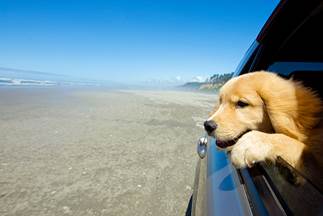IS AUSTRALIA BARKING MAD TO RESTRICT DOGS FROM RIDING ON PUBLIC TRANSPORT?
A University of Sydney study of Sydney dog owners has found that an overwhelming 95% of people are in favour of dogs riding on public transport, with more than half indicating they would do more activities with their hound if they were allowed.
Dog owner survey
The findings of the 2016 survey of more than 1250 Sydney dog owners, published this week in an international transport research journal, found a high level of dog-related car trips (up to 2.4 million each week) in a city where dog ownership is among the highest in the world.
With almost 39 percent of Sydney households owning a dog, University of Sydney researchers Dr Jennifer Kent and Professor Corinne Mulley wanted to find out how people get around with dogs in a city that restricts them from riding on public transport.
Walking your dog – by car
The survey examined the popular activities that owners do with their dog, and how often these trips – such as a walk; visiting the park or other recreational areas; going to dog training, cafés, bars or the shops; and visiting family, friends or the vet – relied on a car:
- On average, people walk their dog twice or more a week and in one quarter of cases they began the outing by car.
- More than three quarters of dog owners who go to a recreational area twice or more a week, 45% of these people went by car.
- Of the two thirds of people who go to the dog park three times a week, more than half went by car.
- Two thirds of people visiting family or friends once a week, 88% did so by car.
- On average, people visit the vet more than three times a year and 86% of these trips are made by car. (Almost 14% of people said that a lack of transport had prevented them from taking their dog to the vet.)
Public transport policy?
When a public transport policy for dogs was posed:
- 95% of Sydney dog owners were in favour.
- Over 55% indicated that they would attend other activities with their dog more often
- 20% said they would consider getting by without a car.
Fewer cars on the roads has to be a plus for Sydney. Getting people moving with dogs are more socially connected with their communities is a huge plus.

Pets on public transport worldwide
The University of Sydney research also investigated the policies of pets on public transport in 30 cities across Europe and the USA. It found all European cities allowed dogs on public transport, while several cities in the US, North America and Australia did not.
Policies varied with areas of vehicle, times of travel and size of dog. Dog fares were charged in most cities. Zurich even offers an annual travel card for dogs.
Activities undertaken by dog owners and the number of dog-related car trips each week
| n=1257 | % of respondents who do the activity | Dog-related trips per week (average) | Dog- related trips per week (total) | % car based | Dog-related trips by car per week |
| Walk | 97% | 2.4 | 2308 | 26% | 609 |
| Dog park | 67% | 3.0 | 2530 | 51% | 1300 |
| Other recreational area | 78% | 2.4 | 2308 | 45% | 1046 |
| Dog training | 19% | 1.5 | 347 | 95% | 329 |
| Café, bar, shops | 53% | 1.4 | 945 | 51% | 481 |
| Visiting friends/family | 67% | 1 | 846 | 88% | 744 |
| Other activities | 28% | 1 | 351 | 92% | 323 |
| Aggregate | 9635 | 4832 |

More about animals and transport
Travelling with animals and pets on public transport in NSW.
Travelling safely with pets on a bus
Jetsetting with Jetpets






One comment
Comments are closed.